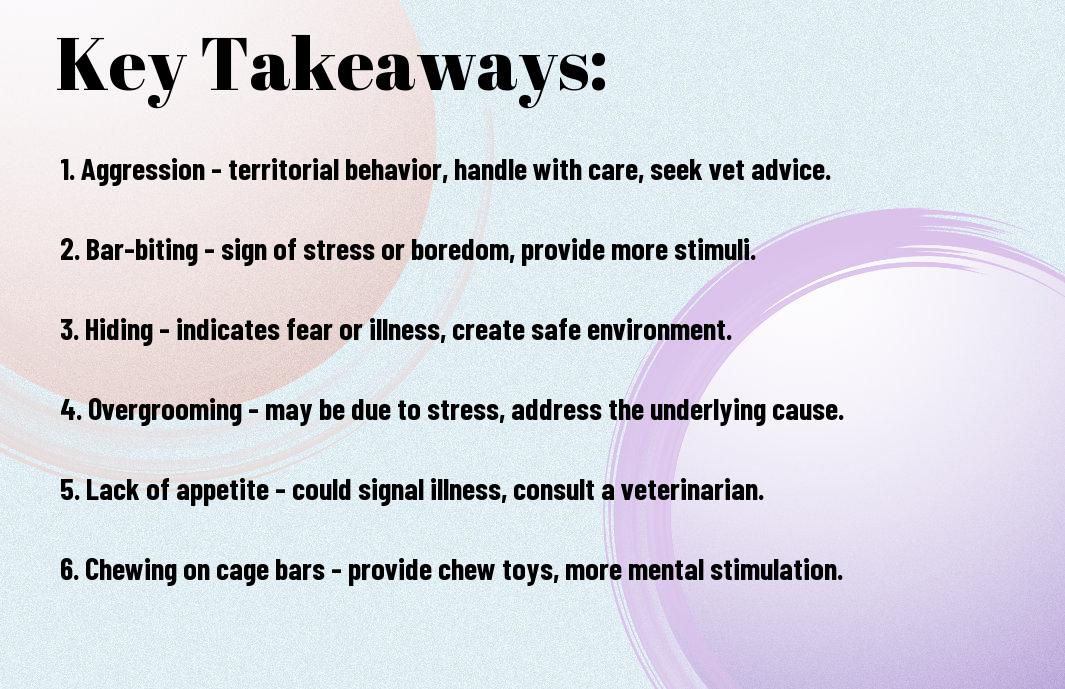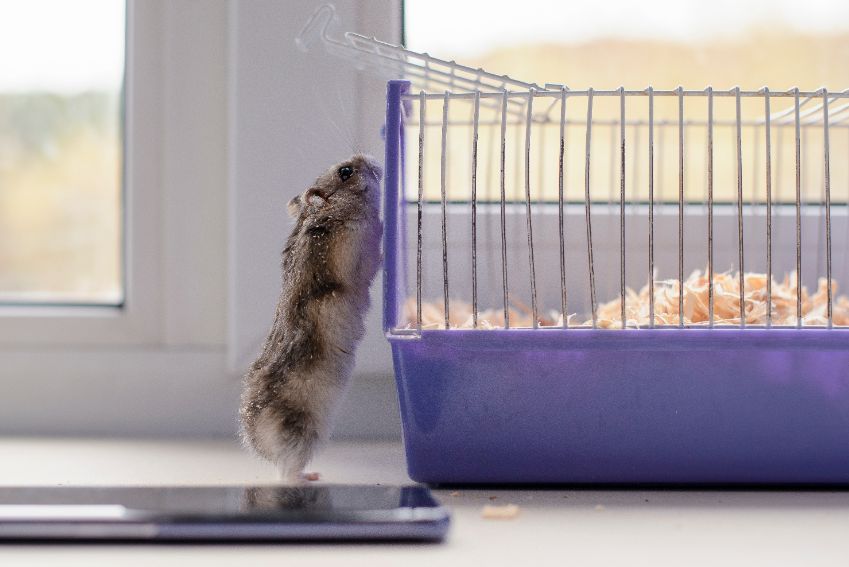Have you ever noticed unusual or concerning behavior in your hamster and wondered how to address it? It’s important to be aware of some of the most common behavioral problems that hamsters may exhibit, and how to handle them properly. This informative blog post will guide you through recognizing and addressing issues like aggression, excessive chewing, and stress in your hamster. By the end of this post, you’ll feel empowered and informed in dealing with any behavioral concerns that may arise with your pet hamster.
Key Takeaways:
- Aggression and territorial behavior: Common behavioral problems in hamsters include aggressive behavior and territorial issues. This can often be addressed by providing separate areas for individual hamsters within a cage, ensuring they have enough space and resources to avoid conflicts.
- Stress and anxiety: Hamsters can exhibit signs of stress and anxiety, such as excessive grooming, chewing on cage bars, or hiding. It’s important to provide a calm and suitable environment, avoiding sudden loud noises and ensuring they have enough places to hide and feel safe. Handling should also be kept to a minimum to reduce stress.
- Overgrooming and self-mutilation: Some hamsters may engage in overgrooming or self-mutilation, often due to stress or boredom. It’s crucial to address the underlying cause and provide environmental enrichment, such as toys and chew blocks, to prevent excessive grooming behavior.

Common Behavioral Problems in Hamsters
Some common behavioral problems in hamsters include aggression and biting, excessive chewing and gnawing, and obsessive hoarding behavior. These issues can be detrimental to your hamster’s well-being and may indicate underlying stress or discomfort. Understanding these behaviors and knowing how to address them is crucial for maintaining a happy and healthy pet.
Aggression and Biting
If your hamster displays aggressive behavior, such as biting or lunging, it may be a sign of fear or stress. This can be dangerous for both you and your hamster, so it’s important to address the issue promptly. Handle your hamster gently and avoid sudden movements to minimize the risk of aggression. If your hamster continues to exhibit aggressive behavior, it may be necessary to consult a veterinarian or animal behaviorist for further guidance.
Excessive Chewing and Gnawing
Hamsters are natural chewers, but excessive chewing and gnawing can be destructive and may indicate boredom or anxiety. Providing chew toys and objects specifically designed for hamsters can help redirect their chewing behavior and prevent damage to their enclosure. Additionally, ensuring that your hamster has enough mental stimulation and physical activity can help reduce excessive chewing and gnawing.
Addressing Behavioral Issues
However, hamsters can sometimes exhibit behavioral problems that may be concerning for their owners. These issues can include excessive chewing, aggression, and antisocial behavior. It’s important to address these problems promptly to ensure the well-being of your pet.
Environmental Enrichment Strategies
One effective way to address behavioral problems in hamsters is to provide adequate environmental enrichment. This can include providing a variety of toys and accessories for your hamster to play with, such as exercise wheels, tunnels, and chew toys. Additionally, ensuring that your hamster has a spacious and interesting living environment can help prevent boredom and destructive behaviors. By offering these enrichment opportunities, you can help keep your hamster mentally stimulated and less likely to engage in problematic behaviors.
Proper Handling and Socialization
Proper handling and socialization are also crucial components of addressing behavioral problems in hamsters. It’s important to handle your hamster gently and correctly to avoid causing stress or fear. Additionally, regularly interacting with your hamster through gentle petting or play can help them become more accustomed to human interaction, reducing the likelihood of aggressive or antisocial behavior. By handling and socializing your hamster appropriately, you can help them feel more secure and decrease the likelihood of behavioral issues.
Health-Related Behavioral Concerns
Your hamster’s behavior can be greatly impacted by its overall health. It’s important to be aware of the potential health-related behavioral concerns that may arise with your pet and understand how to address them effectively.
Impact of Illness on Behavior
When a hamster is not feeling well, it can exhibit various changes in behavior. This may include decreased activity, lethargy, changes in eating or drinking habits, and even aggression. It’s crucial to recognize these signs and seek veterinary care promptly as underlying health issues can significantly impact your hamster’s well-being and behavior.
Identifying and Addressing Health Issues
Regularly monitoring your hamster’s behavior and physical condition can help you identify potential health issues early on. Look out for signs of illness such as weight loss, abnormal discharge, or unusual lumps or bumps. A balanced diet and a clean, stress-free environment can also help prevent many health-related behavioral concerns in hamsters. If you notice any concerning changes in your hamster’s behavior or appearance, consult a veterinarian to address the issue promptly. It’s essential to follow their recommendations for treatment and care to ensure your hamster’s health and well-being.
Preventative Measures and Best Practices
Now that you are aware of some common behavioral problems in hamsters, it’s important to take preventative measures and implement best practices to ensure your hamster’s well-being and happiness. By creating a stimulating habitat and adhering to routine care and monitoring, you can address and potentially avoid these issues altogether.
Creating a Stimulating Habitat
When it comes to preventing behavioral problems in hamsters, creating a stimulating habitat is key. Make sure the cage is spacious enough for your hamster to move around and explore. Provide a variety of toys, tunnels, and chewable items to keep your hamster entertained and mentally stimulated. Additionally, regular cage cleaning and providing a consistent, comfortable environment can help reduce stress and prevent behavioral issues from arising.
Routine Care and Monitoring
Regular care and monitoring are essential for maintaining your hamster’s health and well-being. This includes ensuring that your hamster has a balanced and nutritious diet, access to fresh water, and a clean living environment. Monitor your hamster’s behavior and physical condition regularly for any signs of illness or distress. By being proactive in your care and monitoring, you can address any potential issues before they escalate into more serious behavioral problems.
By implementing these preventative measures and best practices, you can create a more enriching and comfortable environment for your hamster, ultimately minimizing the risk of behavioral problems and ensuring a happy and healthy pet. Remember, taking proactive steps to prevent issues is key to maintaining your hamster’s well-being.
Conclusion
Taking this into account, it is important to be aware of the common behavioral problems that hamsters may experience, such as aggression, chewing, and boredom. By providing a spacious, stimulating environment for your hamster, as well as regular handling and socialization, you can address these issues and ensure your pet’s mental and physical well-being. Additionally, consulting with a veterinarian or knowledgeable pet store staff can provide insights and advice on addressing specific behavioral concerns in your hamster.
FAQ
Q: What are some common behavioral problems in hamsters?
A: Some common behavioral problems in hamsters include excessive chewing, aggression, and abnormal repetitive behaviors such as bar-biting or pacing. Hamsters may also exhibit signs of stress or fear, leading to shy or withdrawn behavior.
Q: How can you address excessive chewing in hamsters?
A: To address excessive chewing in hamsters, provide plenty of chew toys and objects to gnaw on to help wear down their teeth. Ensure that the hamster’s enclosure is appropriately sized and enriched with toys and activities to keep them mentally and physically stimulated. Check for any underlying dental issues that may be causing the excessive chewing and consult a veterinarian if necessary.
Q: What can be done to address aggression and abnormal repetitive behaviors in hamsters?
A: To address aggression and abnormal repetitive behaviors in hamsters, first, ensure that their living environment is appropriate and free from stressors. Provide hiding places and separate living areas if housing multiple hamsters to avoid conflicts. Enrich their environment with tunnels, wheels, and toys to provide mental stimulation. If the behaviors persist, seek advice from a veterinarian or a small animal behaviorist to develop a behavior modification plan.














